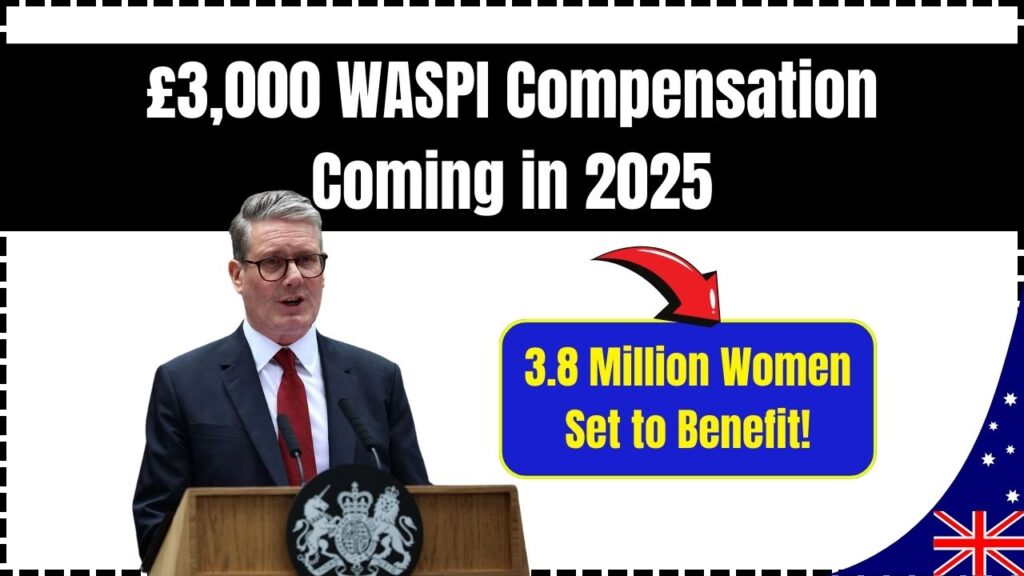£3,000 WASPI Compensation Coming in 2025: The WASPI compensation 2025 topic has ignited public interest and political debate across the UK. The Women Against State Pension Inequality (WASPI) campaign has spent nearly a decade fighting for justice after millions of women were left blindsided by changes to the UK state pension age. Now, in 2025, talks of a £3,000 compensation payout have surfaced—potentially benefiting up to 3.8 million women. But is it confirmed? What’s the government’s stance? Who qualifies? Let’s break it down clearly and accurately.
£3,000 WASPI Compensation Coming in 2025
The battle for WASPI compensation in 2025 is far from over. While the government has refused to act on the Ombudsman’s recommendation, the campaign’s legal challenge could change everything. This issue affects millions of women and raises serious questions about policy transparency and pension justice. Whether you’re directly affected or an ally for fairness, the next few months are critical. Stay informed, stay involved, and support those fighting for justice.

| Aspect | Details |
|---|---|
| Affected Group | Women born between April 1950 and April 1960 |
| Issue | Inadequate communication about state pension age increases |
| Recommended Compensation | Up to £2,950 per person (Parliamentary Ombudsman recommendation) |
| Government’s Position | Rejected compensation, citing most women were aware of changes |
| Legal Action | WASPI pursuing judicial review; over £180,000 raised for legal costs |
| Estimated Cost to Government | Up to £10.5 billion if compensation is awarded to all affected women |
| Official WASPI Website | https://www.waspi.co.uk |
Understanding the £3,000 WASPI Compensation Coming in 2025
The Background
In 1995, the UK government passed the Pensions Act 1995, which aimed to equalize the state pension age between men and women. Previously, women could retire at 60, but the new law sought to increase their retirement age to 65, in line with men. This change was later accelerated by the Pensions Act 2011.
Unfortunately, the Department for Work and Pensions (DWP) failed to communicate these changes properly. Many women only discovered their retirement age had increased just before turning 60—leaving little to no time to prepare financially.
The WASPI Mission
Formed in 2015, WASPI (Women Against State Pension Inequality) campaigns for fair and fast compensation, not against pension age equalization. The core issue is the lack of notice, which denied millions of women the chance to adjust savings, retirement plans, and work life.
Historical Timeline of Events
- 1995 – Pensions Act introduced gradual equalization of pension age.
- 2011 – Acceleration of changes under new legislation.
- 2015 – WASPI campaign founded.
- 2021 – Parliamentary Ombudsman finds DWP guilty of maladministration.
- March 2024 – Ombudsman recommends compensation of £1,000–£2,950.
- December 2024 – UK Government rejects recommendation.
- 2025 – Legal action escalates with judicial review.
Real People, Real Impact
Let’s look at two anonymized stories to understand the emotional and financial strain:
Case Study 1 – Susan, 64, Liverpool
Susan planned to retire at 60, relying on her modest savings. When she found out she’d have to wait until 66, she had already quit her job. Without a pension or income, she relied on housing benefit and food banks for over a year.
Case Study 2 – Elaine, 68, Bristol
Elaine was informed just two years before her expected retirement. She scrambled to find work after being laid off and eventually took on multiple part-time jobs with no benefits. The stress affected her mental and physical health.
Ombudsman’s Recommendation and Government Pushback
The Parliamentary and Health Service Ombudsman (PHSO) concluded in 2024 that the DWP failed in its duty. It recommended that affected women should be paid compensation between £1,000 and £2,950 based on individual impact levels.
However, in December 2024, the government formally rejected the proposal. Secretary of State for Work and Pensions, Liz Kendall, stated that most women had adequate awareness of the changes and that mass compensation would cost up to £10.5 billion—making it, in the government’s view, unfair to taxpayers.
WASPI’s Legal Response
Not accepting defeat, WASPI launched a judicial review to challenge the government’s decision. Backed by public support, they have raised over £180,000 in legal funding and aim to reach £230,000. The outcome of this legal battle could determine whether women will receive compensation and when.
Who Is Eligible for WASPI Compensation?
To potentially qualify for compensation (if awarded), you should:
- Have been born between 6 April 1950 and 5 April 1960
- Have received inadequate notice about pension age changes
- Have suffered financial hardship or emotional distress
Economic and Social Implications
This issue is not just about pensions. It’s about gender fairness, retirement security, and public trust in government communication.
Financial experts suggest the government’s stance could worsen the gender pension gap. With many women already at a disadvantage due to part-time work and caregiving roles, this lack of redress deepens inequality in old age.
What Should You Do for £3,000 WASPI Compensation Coming in 2025?
Step-by-Step Guide for Affected Women:
- Stay Informed
Sign up for WASPI updates via https://www.waspi.co.uk - Gather Documentation
Keep letters from the DWP and personal statements showing how you were affected. - Get Legal Support
Contact a solicitor or advocacy group if unsure about your rights. - Support the Campaign
Donate to the legal fund or share your story on social media using #WASPI. - Check Government Resources
Visit gov.uk/state-pension-age to verify your pension age.
New Mums: Claim Your £1,000 DWP Grant Now – No Repayment Needed!
April 2025 Benefit Boost: PIP & DLA Payments Increased – See Your New Rates Now!
Born Before 1958? You Could Receive a £4,000 Pension Boost – See If You Qualify!
Frequently Asked Questions (FAQs)
Is the £3,000 WASPI compensation confirmed in 2025?
No. While the Ombudsman recommended up to £2,950 in compensation, the UK government rejected the proposal. Legal proceedings are ongoing.
When could compensation be paid?
If the judicial review succeeds, compensation schemes could be discussed in Parliament later in 2025. No payment dates are confirmed yet.
How many women are affected?
Approximately 3.8 million women born between April 1950 and April 1960.
Is there a petition or group I can join?
Yes. Visit https://www.waspi.co.uk to join or support your local WASPI group.






